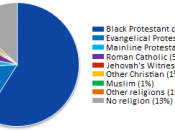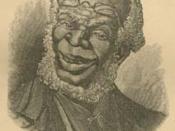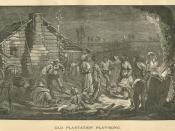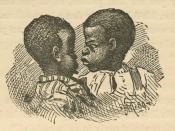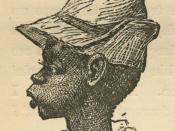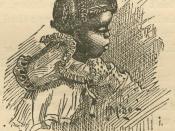Dialectical Controversy
Stories have existed since the beginning of mankind. Going back as far as ancient Greece in history, or even further back, one can examine the many different types of stories that have been passed down. The Ancient Greeks wrote about gods and developed drama; the Romans passed down biographies of Caesars containing their life achievements as well as their failures; numerous stories questioning the institution of slavery were produced here in American. Usually by reading the work of an author one is able to find a message or a moral hidden beneath the storyline. In most cases, authors dictate their writings in their culture's dialect for many different reasons, many reasons of which that would not conclude them as being racist for using it.
Black Dialect is used in many stories throughout American history. This dialect represents a time period of freedom. The representation of dialect writing was a "chain" it linked African American's to a conventional past that was contrived by others (Nicholls 277).
The dialectal writings show no concern for racism. The American language is intended to absorb the racial and ethnical differences (Nicholls 279). Its intent is sought for the reader's attention not only by the storyline itself but by the dialect it uses to draw out the reader's imagination in the story.
Also known as Black English, Black dialect, like many other dialects is drastically identified as a complete, "rule-governed", form of language. To those who use black dialect, there is a less sufficient understanding of the actual meaning. The black community may protest Black English because of the controversy it causes. Because of these effects, some concluded that black people suffered from "self hatred" due to domination. Racism and oppression may prolong to exist, but black antagonism in textbooks in Black English is not evidence of "self hatred" (Hoover 65). With this being stated throughout the studies of Black English, one cannot attain that Black English is flat out racist either.
The use of dialect sets a distinguishing setting throughout a story. Without dialect the reader may be lost or confused about where the story may be taking place and what initially is going on at the time of the story. This is an advantage for dialect that helps the reader understand on a non-racist level, especially if the reader is not from the same culture as the writer or story teller. In her story, "When Brer Deer and Brer Terrapin Runned a Race," Emma Backus, says, "So he say, Brer Coon did, how Brer Deer and Brer Terrapin shall run a seven-mile race, and the one what get there first shall surely have the gal', 'cause he feel that sure in he mind, Brer Coon do, that Brer Deer nat'rally bound to outrun old Brer Terrapin" (Lauter, Alberti, and Brady 37). This clearly sets a setting for the story and makes the reader clearly understand that this story is from long ago and is not in present time. The dialect used only portrays how the story was told and in no way should it have a racist affect on the reader.
When an author uses dialect, he or she creates an entire world, which directly reflects their very own experience. Without it, the story becomes less interesting and more boring to a reader. Dialect generates a more personal outlook on what the author is really trying to state throughout the story. Since most of the African American Tales were not written down until much later in time, writing them down in the dialect they were told in, exposes a new role for dialect to play. It is no longer just words on a page, it becomes real to the reader, and it is a picture in their mind they can play over and over again as they read the story.
To call the use of writing in dialect a racist trend, one would not know much about their own culture. The entirety of a culture may not be the language it uses, but part of it is. As a whole a culture's language entitles it to convey who they are and where they come from. The dialect used by Joel Chandler Harris in "from Uncle Remus: His Songs and His Sayings" exposes how they spoke to one another in this era of time. It illustrates how they did not have an educational background. Also, the dialect indicates the clarity between the story teller and the person listening. If this is how they spoke to one another, then why not write it that way? Writing in dialect gives African Americans something to call their own. Many may think that the dialect represents a negative shadow on the African American culture, but it really does not. One may show that a way of speaking is based on the influenced structure that reduces the equivalency and not on the natural value that dialect reveals how the social standard is an unjustly disadvantage to an entire part of a population (Dundes and Spence 85). The black dialect used in this story does not antagonized black people in a harmful way; it simply states how they spoke. Once many African Americans acquired an education and more learning was available to them, their language presumably got better. With this being said, the racist card should not be played when using dialect in late nineteenth century American Literature.
The use of dialect makes the story's characters more understandable. For instance, if the author uses a black dialect in their story, the reader automatically understands that the characters are probably slaves and how they are being treated. As a reader, many pick up on these certain aspects of writing, if it is written how it was originally said, yes it may be a little hard to understand now, but it is much easier for the reader to put his or herself into the characters shoes to understand what is actually going on. Also, with dialect comes much detail. Mark Twain is a prime example of this; in his work "A True Story Repeated Word for Word as I heard it," he says in great detail what exactly "Aunt Rachel" looked like. "She was mighty framed and stature; she was sixty years old, but her eye was undimmed and her strength unabated." After an explanation of such, it becomes much easier for the reader to identify what the characters look like and what role they might play. Most readers would not consider dialect and adding great detail a racist remark. If anything, it adds a positive tactic the storyline itself.
Many people who read dialect may assume that black dialect is inferior. It is in the presence, in movies watched in theatres, shows watch on television, and within interacting with others. After viewing ways of which Standard English is as peculiar and characteristic as black dialect is, one comes to the realization that black dialects expected inferiority is only an insight of it (Dundes and Spence 91). The assumption that black dialect is inferior to all other dialects is what makes it seem like it may come off as racist. As stated before, black dialect was the way the African Americans spoke to one another in the late nineteenth century. If an author decides to use it because it adds "color" to his or her story, it should not be called racist.
Storylines dictate what the author is trying to tell the reader; therefore the dialect in the story is only there to depict how the story was told. Black dialect is a "unique but not inferior system of English grammar." It is a grammar that boosts debates of discrimination and racial bias because of its diverse meanings (Dundes and Spence 85). This only states that there is many different ways of which black dialect can be interpreted. The thought of black dialect being racist is frightening. If it was easier to disgrace others by writing the way the culture spoke, then wouldn't all authors turn to writing in dialect when trying to get a point across? Racism should not play a factor in dialect.
The idea of black dialect representing racism is very crucial but abundantly denied because of its characteristics and what the author brings with it. If an author who writes or tells a story in black dialect is considered being racist and they are black themselves, the circumstances have become unfair. The author may only be trying to describe what life was like in the late nineteenth century, under no circumstances is he trying to portray African Americans as a certain "type" or more underprivileged culture than the rest. Language must change in order to accommodate new speakers and new meanings, therefore how can one tell what is new if they have never been shown the old? (Nicholls 281) Dialect serves a purpose in stories; it is not there to just be made fun of.
Dialect in a storyline gives a story color. It lets the light in among many other things. It shows character and may even enlighten the mood of the story. It can foreshadow a story in a negative or positive way but in no way is it meant to be racist. Dialect tells a story and without it a story that meant so much before can now seem completely naked. It is simply a special language a culture has in common, it creates new beginnings, new meanings, for so many different things. As Michael North stated, "Language exists and grows by inclusion" (Nicholls 281).
�
Works Cited
Dundes, Lauren, and Bill Spence. "If Ida Kown: The Speaker Versus The Speech In Judging Black Dialect." Teaching Sociology 35.1 (Jan 2007): 85-93. JSTOR. Web. 10 Feb. 2010. <http://www.jstor.org/stable/20058532>.
Lauter, Paul, John Alberti, and Mary Brady. The Heath Anthology of American
Literature, Volume C. Wadsworth Pub Co, 2009. 37-108. Print.
Mary Rhodes, Hoover. "Community Attitudes Toward Black English." Language in Society 7.1
(Apr 1978): 65-87. JSTOR. Web. 10 Feb. 2010. <http://www.jstor.org/stable/4166974>.
Nicholls, David G. "Review: untitled." University of Chicago Press 95.2 (NOV 1997): 276-81. JSTOR. Web. 19 Feb. 2010. <http://www.jstor.org/stable/439003>.
